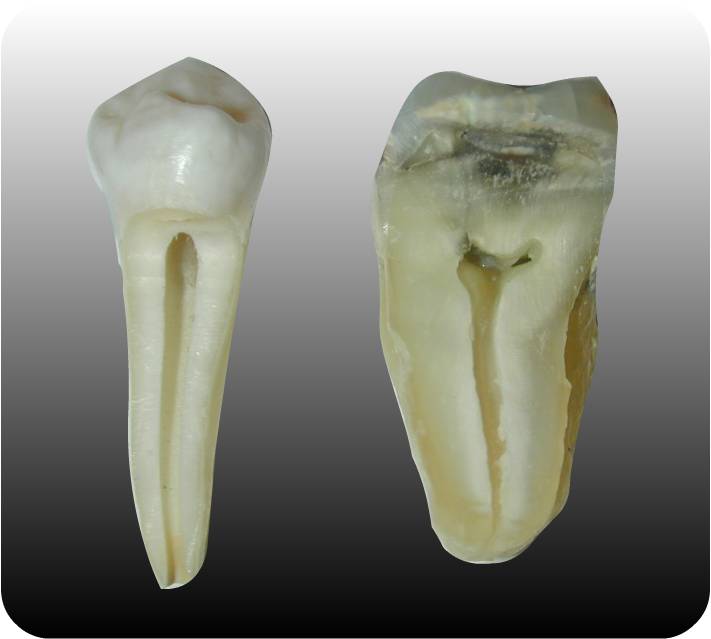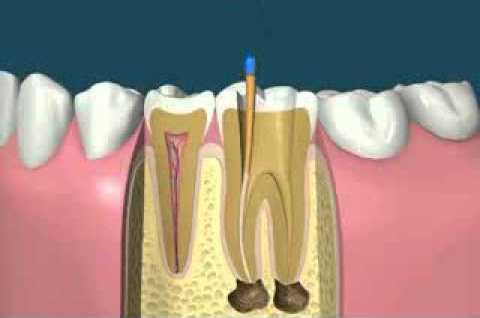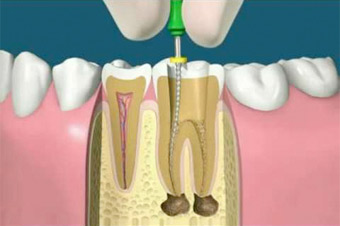Endodontics
What is endodontic treatment?
“Endo” is the greek word for "inside" and "odontos" for "tooth". Endodontic treatment treats the inside of the tooth. To better understand endodontic treatment it helps to know a little about the anatomy of the tooth. Inside the tooth, under the white enamel and the layer of hard tissue called dentin, there is a soft tissue called pulp inside a root canal. The pulp contains blood vessels and nerves and is important during growth and development of the tooth, however, once the tooth is completely mature it can survive without pulp, because the tooth continues to be nourished by its surrounding tissues.

Why would I need a root canal procedure?
Endodontic treatment is necessary when the pulp has been inflammed or infected. Inflammation or infection can have a variety of causes: deep caries, repeated dental procedures on the tooth or a fracture or contusion on the tooth. If inflammation or infection of the pulp are not treated, they can cause pain or cause an abscess.
What are the signs of the need for endodontic treatment?
The signs to look for include pain, prolonged sesitivity to heat or cold, tenderness to touch or when biting, tooth decoloration and inflammation, suppuration and tenderness in lymph nodes as well as in bone or gums near the area. Sometimes, however, there are no symptoms.
How does endodontic treatment save the tooth?
The endodontist removes the inflammed or infected pulp, carefully cleaning and shaping the inside of the root canal of the tooth and then fills and seals it. Later, you will go back to the restorative dentist, who will place a crown or other restoration on the tooth to protect and restore to total function. After the restoration the tooth continues to function like any other tooth.


Will I feel pain during and after treatment?
Many of the endodontic procedures are done to remove pain from the teeth caused by pulp inflammation or infection. With modern techniques and anesthetics, most of the patients report being comfortable during the procedure. The first few days after treatment, the tooth can remain sensitive, especially if there was pain or infection prior to the procedure. Follow your endodontists instructions carefully. The tooth can continue to feel different from the other teeth for a while after finishing the endodontic treatment.
Will the tooth need any special care or more treatment after endodontic treatment?
The non-restored tooth is susceptible to fracture, so you have to visit your restorative dentist for a complete restoration as soon as possible. Other than that, you just need to continue practicing good oral hygiene, including brushing, flossing and regular dental check ups and cleanings. Most endodontically treated teeth last just like a natural tooth. Occasionally, the tooth can turn painful or diseased months or even years after succesfull treatment. Often, when this happens, doing the procedure again may save the tooth.
What causes an endodontically treated tooth needing additional treatment?
Another trauma, deep caries, or a fractured or defective restoration may cause new infection on the tooth. In some cases, the endodontist discovers additional very narrow or curved root canals that could not be treated during the initial treatment.
Can all teeth be treated endodontically?
Most teeth can be treated. Occasionally, a tooth cannot be saved because the root canals are not accesible, the root is severely fractured, the tooth does not have adequate bone support or the tooth cannot be restored. When endodontic treatment is not effective, endodontic surgery may save the tooth.
Who must perform endodontic treatment?
Endodontic specialists have at least two years of specialized and advanced education in the diagnosis and treatment of root canals. Because they limit their practice to endodontics, they treat these types of problems everyday. They use their specialized training and experience to treat difficult cases, like teeth with narrow, blocked or with uncommon anatomy root canals.





